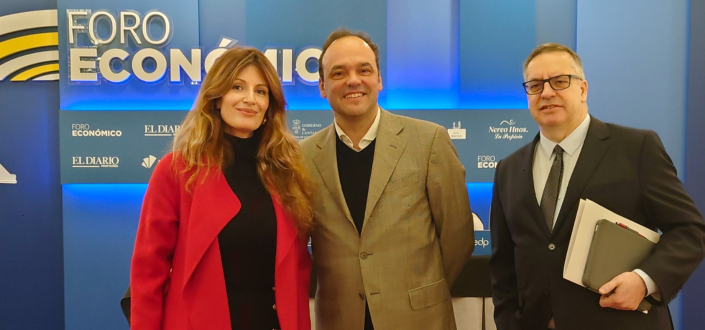The Vice-Rector for Academic Planning and Teaching Staff of the European University of the Atlantic (UNEATLANTICO), Dr. Silvia Aparicio, participated in the colloquium of the Economic Forum of El Diario Montañés, a reference space for the analysis of the economic prospects of the country and the region. In this edition, the meeting included the intervention of the economist José Carlos Díez, who addressed the current economic situation and its projections for the future.
The meeting, moderated by Íñigo Noriega, director of El Diario Montañés, took the form of an informative breakfast. During his conference, José Carlos Díez offered an optimistic diagnosis of the Spanish economy, highlighting positive indicators in employment, activity and business sales. He also pointed out that Spain has overcome the most severe energy crisis since the 1970s and that inflation, despite its impact, has not generated the difficulties initially predicted. However, he warned of the risks arising from high public debt and the challenges that a new expansionary economic cycle could bring, drawing parallels with the real estate bubble of the late 1990s.
During the subsequent colloquium, Dr. Silvia Aparicio provided an analysis of the disconnection between macroeconomic data and public perception of economic stability. While GDP growth and unemployment reduction are encouraging indicators, she stressed that issues such as housing prices, inflation and the resulting decline in purchasing power continue to generate uncertainty among the population. In this respect, he agreed with Díez on the need to analyse the economy from a perspective that is closer to the everyday reality of citizens.
In the international sphere, key issues of political and economic stability were addressed, highlighting Spain’s position compared to other European countries. Díez also expressed his concern about the growing influence of interest groups in US politics, referring to the incorporation of business figures such as Elon Musk in the Oval Office.
A central aspect of the debate was the situation of young people in the labour market. In the case of Cantabria, the problem of an ageing population was highlighted, as well as the need to implement strategies that favour the attraction and retention of young talent, a determining factor for regional competitiveness.
The participation of Dr. Silvia Aparicio in this forum reinforces the commitment of the European University of the Atlantic to debate and reflect on current economic challenges and their impact on society. The University’s degree in Business Administration and Management (ADE) encourages these initiatives that contribute to the development of critical thinking and debate in the university environment.


